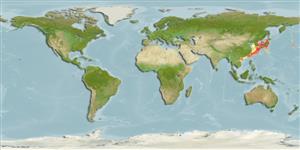Teleostei (teleosts) >
Pleuronectiformes (Flatfishes) >
Pleuronectidae (Righteye flounders) > Hippoglossinae
Etymology: Eopsetta: Greek, eos = dawn, aurore + Greek, psetta = grouper (Ref. 45335).
Eponymy: Alexander Vasilevich Grigoriev (1848–1908) was a Russian botanist and ethnographer who became Secretary of the Imperial Russian Geographical Society (1883–1903). [...] (Ref. 128868), visit book page.
More on author: Herzenstein.
Environment: milieu / climate zone / depth range / distribution range
Ecology
Marine; demersal; depth range 60 - 1325 m (Ref. 56557). Subtropical
Northwest Pacific: Pacific coast of Japan, Sea of Japan, Yellow Sea, Gulf of Po-Hai, East China Sea to Taiwan.
Size / Weight / Age
Maturity: Lm ? range ? - ? cm
Max length : 60.0 cm TL male/unsexed; (Ref. 56557)
Short description
Identification keys | Morphology | Morphometrics
Found in the sublittoral zone, above 200 m on sandy mud bottoms (Ref. 11230). Cultured and released for fishery in Japan.
Life cycle and mating behavior
Maturity | Reproduction | Spawning | Eggs | Fecundity | Larvae
Vinnikov, K.A., R.C. Thomson and T.A. Munroe, 2018. Revised classification of the righteye flounders (Teleostei: Pleuronectidae) based on multilocus phylogeny with complete taxon sampling. Molecular phylogenetics and evolution, 125:147-162. (Ref. 122998)
IUCN Red List Status (Ref. 130435: Version 2025-1)
Threat to humans
Harmless
Human uses
Fisheries: commercial; gamefish: yes
Tools
Special reports
Download XML
Internet sources
Estimates based on models
Preferred temperature (Ref.
123201): 0.4 - 16.2, mean 8.8 °C (based on 106 cells).
Phylogenetic diversity index (Ref.
82804): PD
50 = 0.7500 [Uniqueness, from 0.5 = low to 2.0 = high].
Bayesian length-weight: a=0.00708 (0.00403 - 0.01245), b=3.08 (2.92 - 3.24), in cm total length, based on LWR estimates for this species & (Sub)family-body (Ref.
93245).
Trophic level (Ref.
69278): 3.8 ±0.2 se; based on size and trophs of closest relatives
Resilience (Ref.
120179): Medium, minimum population doubling time 1.4 - 4.4 years (K=0.21-0.30).
Fishing Vulnerability (Ref.
59153): Moderate vulnerability (42 of 100).
🛈
